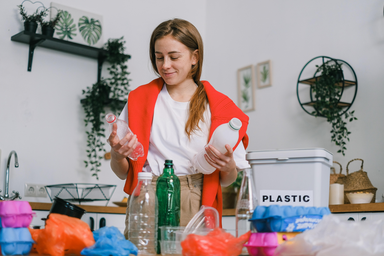Living more sustainably means recognizing the social, environmental and economic effects of our actions and developing methods of maintaining the resources necessary for the success of future generations. Although major change needs to be made at the corporate level to increase sustainability, we as individuals can still be mindful of how our own choices can affect the environment and communities around the world.
It’s important to recognize that everyone’s ability to make sustainable decisions can be limited by circumstances, but that we still can implement changes using the tools available to us. This list comprises a few suggestions for small acts that can make a big difference!
Wash Your Jeans Less
You might not be aware of the potential pollution that results from doing laundry. Specifically, microfibers from clothing fabric and chemicals used for coloring and treatment processes are washed away in the laundering process and deposited into the world’s water supply. Though wastewater treatment plants do implement purification processes that capture microfibers, it is estimated that 500 fibers per laundry load remain in treated water.
By washing your denim jeans less, you can curb your contribution to this wash cycle pollution. Denim jeans specifically don’t need to be washed as regularly as other garments. In fact, the classic denim brand Levi’s suggests only washing your jeans after every ten wears or until they begin to smell.
Use Less Electricity
The process of producing electricity contains several steps that negatively affect the environment and the health of individuals. Carbon dioxide (CO2) emissions that result from the burning of fossil fuels is one of the largest consequences of energy production, but water pollution and physical waste creation are also harmful side effects. Not only do these things harm the environment, but they also have adverse health effects.
Small acts like turning off the lights when you leave the room or switching off the air when you’re out of the house for a day can help reduce energy waste. Though the precise impact of turning off the lights depends on the type of bulbs used, being aware of how your own actions can improve sustainability is an important step in addressing climate change. Plus, it can help you cut down on your own energy bill!
Walk Instead of Drive
Cars are a major contributor to greenhouse gas emissions and air pollution, so walking instead of driving can reduce your individual impact on the environment. A study from the Pacific Institute found that walking 1.5 miles would eliminate 75% of greenhouse gas emissions caused by driving the same distance. Not to mention, this act of sustainability is also better for your health and more economic!
Buy Eco-Friendly Products
Many everyday household products have negative environmental effects unknown to consumers. Specifically, the chemicals used in household cleaners and beauty products can result in water pollution and damage to natural habitats. Household cleaners, in particular, can also pose health risks.
Being an informed shopper and purchasing greener products can increase sustainability. However, it is important to keep in mind that not all products that are advertised as eco-friendly are truly so. Consumers should be aware of “greenwashing,” a term that refers marketing strategies used by companies to appeal to the environmental concerns of shoppers without addressing environmental issues.
Using tools like the United States Environmental Protection Agency’s (EPA) Safer Choice database to identify eco-friendly house products or Leaping Bunny’s Compassionate Shopping Guide to find cruelty-free beauty products are some of the best ways to ensure you are shopping green.
Recycle!
Aluminum, glass, plastic and paper products contribute to landfill waste and pollution, but recycling these items is one of the biggest ways to improve sustainability. According to the Natural Institutes of Health, recycling preserves non-renewable resources, conserves energy, uses less water and reduces pollution.
As Baylor has recycling containers across campus and in residential facilities, recycling is made even easier for us students. You can refer to Baylor’s recycling page to learn more about recycling and find recycling containers on campus. If you are living off campus, check out Waco’s recycling program or use How2Recycle’s database to see what recycling options your community offers.
Implementing these small changes into our lifestyle may seem miniscule, and we won’t save the world without commitments from governments and corporations, but each individual impact we can make is important in accomplishing lasting sustainability!

